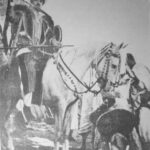MUHAMMAD, ABD ES-SHAKUR
- 2 Min Read
Muhammad Abd Es-Shakur was emir of Harar from 1856-75. Previously a sheikh, he had seized power on the death of the last emir of the Nur dynasty, Ahmad bin Abu Bekr.
During Muhammad’s reign, the territory of Harar was limited to the town and its surrounding territories. It was entirely dependent on the goodwill of the local Qottu Galla tribes, who inhabited the countryside. Muhammad maintained his personal position through following an accommodating policy towards the Qottu Galla, thereby alienating the Harar population. Since Harar was still an important market-place for a large area in the Horn of Africa, Muhammad’s main activity was trading, especially with the coast. Another source of income was the issuing of coins of doubtful value, and the enforcement of their circulation.
Muhammad ruled autocratically. As he showed himself to be selfish, he became very unpopular. According to oral tradition, the Harari people were not allowed to wear better clothes or to eat better food than the emir and his family. When the Egyptian army under Rauf Pasha approached Harar in 1875, the emir could not offer any resistance.
A delegation of prominent citizens, including the emir’s son Abdullahi Ali Abd Es-Shakur, met Rauf Pasha, and surrendered. Some fighting broke out later between the Egyptians and the Galla, but the latter were quickly defeated. Muhammad then swore allegiance to the Egyptian Khedive on October 11, 1875, and was presented with a gift of 800 thalers. A few days later he was assassinated during his evening prayers by an Egyptian soldier, most probably at the instigation of the people of Harar.
STANISLAW CHOINACKI





